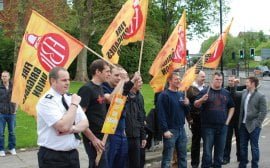Over the three days of 2nd-4th May the Fire Brigades Union resumed strike action to defend the pensions of firefighters. These three days now make up twelve days in total that have seen strike action taking place and are a reflection of the anger felt by firefighters over these attacks on their pensions. Darrall Cozens, President of the Coventry TUC, looks at the fight by FBU members to defend pensions.
Over the three days of 2nd-4th May the FBU (Fire Brigades Union) resumed strike action to defend the pensions of firefighters with members walking out for five hours on Friday, 12 hours on Saturday, and five hours on Sunday. These three days now make up twelve days in total that have seen strike action taking place and are a reflection of the anger felt by firefighters over these attacks on their pensions.
Fair, workable, and affordable
FBU members are not asking for the moon. In the words of FBU General Secretary Matt Wrack, all the members want is a pension deal that is “fair, workable and affordable”, but that is the very thing that the government does not want to give. For Cameron and Osborne pension “reforms” have to take place as part of the drive to cut public spending to balance the budget – “reforms”, therefore, are nothing more than a euphemism for cuts. And why is there a budget deficit? Because public money was used to bail out the banks in 2008 and as part of the crisis of capitalism that saw government spending rise in benefit payments when government income was falling, hence the deficit.
Over Christmas and the New Year FBU members also took strike action, but stopped in order to enter into negotiations with the government to find a deal. Despite offering concessions and being even willing to make compromises, the government response was to spin out the talks for almost four months without any firm offer being put on the table. In total, negotiations over the pensions have been going on for three years!
All along the FBU has made it clear that industrial action would be called off if there were a revised pension offer based on the evidence that has been submitted. They even asked the government to come forward with a revised offer before April 24th in order to avoid strike action. This did not happen. Yet to add fuel to the fire, a leaked letter sent to the chairs of fire authorities states that the fire minister, Brandon Lewis, and the government had fully-costed alternative proposals as early as March 19th but these had not been shared with the FBU.
Provocation and blame
In effect, this action has provoked firefighters to once more enter into industrial action that could have been avoided. As Matt Wrack stated, “These strikes have only resumed because of a complete absence of proposals from government. Rather than speculate on the motivations for their behaviour, now that we know costed proposals exist, we call on the minister to send us proposals without any further delay.” He continues, “Just like the current bout of industrial action, future strikes could be avoided simply by the government honouring current pension promises and releasing proposals for the future that reflect the discussions we’ve held over the last three years and take account of the evidence we have presented about our occupation.”
A cat and mouse game is under way. The government wants to put the blame for the failure of the talks on the backs of the FBU and hopes thereby that the will of the firefighters can be broken and the public turned against the FBU. The FBU, on the other hand, has clearly shown its willingness to talk and even offer concessions to arrive at a deal.
High stakes
Yet the stakes are high. The third increase in FBU pension contributions has just taken place bringing the total paid into the pension by firefighters to 14.2% of gross pay, one of the highest in the public service. For a firefighter on average wages the contribution is more than £300 per month. This has a number of effects: new entrants to the service can’t afford to join the pension scheme; existing members find it hard to pay other bills; and the pension scheme as a whole is becoming unaffordable.
In addition, there is the issue of the retirement age. The government wants to increase it from 55 to 60 yet its own investigations have shown that 93% of existing firefighters will be incapable of doing the job beyond 55 and so will either be sacked through incapacity or leave the service. In doing this they could lose up to 47% of their pensions.
Compromise or fight
The FBU is one of the best organised sections of the working class with a trade union density of between 80 and 90%, and they are at the moment in the vanguard of the fight against the government. A victory for the FBU will give a signal to other sections of the working class that if they are willing to fight and take action, they too have a chance of beating the government. The Coalition knows this all too well and at this moment is not prepared to make concessions that would cut across the deficit reduction programme.
However, given the dangerous nature of the job that firefighters do and the tremendous latent support amongst the public for firefighters, it is not beyond the realms of possibility that the government will find some unknown official who will say that firefighters are a special case. That would be risky, but the only way to resolve the dispute is either for concessions to be made and if the government won’t budge, the FBU will have to.
There is a hint of this in one of the latest statements from the FBU which says that “the pensions of existing firefighters are not sufficiently protected from the proposals and existing agreements are being ripped up”. Can this be read as heralding a possible two tier pension system, one for existing firefighters and another for new entrants? Such a compromise happened with local authority workers not so long ago where older workers within ten years of retirement had their pensions protected whilst younger workers had to work longer, pay more and get less when they retired. That concession led to Unison stepping away from the pensions’ battle.
The workers united will never be defeated
If this were to happen with the FBU, the unity of all members so far achieved would be undermined and such unity is essential if it is decided to fight even harder with escalating strike action, calling on support from other sections of the labour and trade union movement and the public. Such a fight would need a steely resolve from both the FBU leadership and the members.
The real possibility of public support was shown on Saturday on the picket line at the Radford Road fire station in Coventry. An elderly man came up to give support. In the conversation that followed he turned out to be an old militant who was once in the Communist Party and then the Labour Party, but cannot stand Miliband. His first words were, “Where is the petition and where is the strike fund as I want to make a contribution?”
The ball is now in the government’s court. They have to respond to the latest round of strike action. If they don’t, the only way forward is for the FBU to ramp up the action and call on the movement and the public for support. It will be there.






